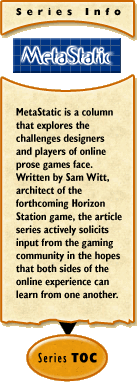 Fighting Burnout
Fighting Burnout
by Sam Witt
February 7, 2001
You've been playing BunnySlayer for months now, your character's mantle is littered with lucky rabbit feet and little fluffy tales. Among the other garden warriors, your name is legend, and the rabbits wet themselves in horror when they see your boots in their garden. Life is good.
And then, one day, you log in and find that you don't WANT to hunt the fluffy bunnies. In fact, you're starting to think that it might be a good idea if you maybe worked in the garden, instead of just keeping it clear of bunnies. You know, tilling the soil, keeping the weeds away from your carrots, watering your vegetables, that sort of thing. Only, well, you can't. Because BunnySlayer isn't about gardening, it's about hacking up hapless bunnies. And so, you suffer from gaming burnout.
As a game designer, burnout annoys me. It means that the game itself was put together to satisfy a particular style of play, and only that style of play. Whether that support is geared around killing monsters, growing tomatoes, or stamp collecting, there is a hard limit on the type of activities that players can enjoy.
Games can't have a limitless supply of activities for players. Coding takes time, and there is a finite amount of design work that any team can do for a game. But what I don't understand is why so many games have so little variety in the types of activities they support. In most games, for instance, once you get tired of whacking monsters, your only alternative is to quit playing and fire up your copy of The Sims.
I think that a lot of this comes from the reluctance of designers to allow players to have flexible characters. Once a character has started down a path of development, it is usually not feasible for the same character to begin dabbling in other activities. To all aspiring game designers out there, I beg you: do not develop a game that artificially limits the advancement options of a character. Make it difficult to learn new skills, by all means, but never, ever say: "You are a warrior, you will never learn magic."
But letting players advance their characters in a wide variety of skills is only part of the cure for burnout. Another piece is making sure that your skills are very, very different. In Horizon Station, for instance, there are combat skills and then there are science skills. While it is possible to learn both types of skill over time, the activities these skills apply to are completely different. One is concerned mainly with putting the boot to alien invaders, while the other is focused on rebuilding the damaged station, creating new pieces of equipment, and repairing existing equipment. When characters get bored with one type of activity, they can start training themselves to take part in its opposite number.
Once you've given players a couple of different types of activities to engage in, start putting in non-advancement hobbies for the characters to play with. Dart boards, card games, race cars, rock-em-sock-em robots – anything that can be done quickly, is a social activity, and has some sort of reward. Gambling games are popular, and most are pretty easy to implement. A blackjack table in a restaurant, for instance, became a very hot gathering spot in one game I played. Think of things you can include that give characters a place to relax, socialize and be entertained. Your players will love you for it.



